Online Master’s in Education Programs
This page covers top online master’s degrees in education that lead to initial teaching licensure. These degrees are for career switchers with a bachelor’s degree outside of education.
In addition to our proprietary ranking of top programs, this page covers the pros and cons of online study, accreditations to consider, and profiles of top programs.
Table of Contents
- Factors to Consider With Online Study
- Best Online Master’s in Education Programs
- Profiles of Top Education Schools With Online Programs
- Frequently Asked Questions
Factors to Consider With Online Study
Many popular specialties and concentrations are available online, including elementary education, middle grades education, and secondary education.
Although many online teaching degree programs offer real-time video conferencing and remote lectures, much of the coursework is completed asynchronously, so online students must be self-disciplined and self-directed in order to succeed.
You will likely need to complete student teaching fieldwork for at least one semester to qualify for teacher certification, depending on the requirements established by your state and program. You should confirm your program helps with such placement in your local school districts.
Finally, while many online education programs can lead to first-time teacher certification, not all specializations may be offered through distance learning or be recognized in all states. Consider carefully which grade level(s) and subject(s) you want to teach and research your state’s certification requirements. Those who are attending an out-of-state program commonly must be recommended for a license in the state where the program is located, and then apply for certification by reciprocity in their home state. Your school should be able to help guide you on these issues.
Teacher Licensing With an Online Master’s Program in Education
Two of the most important factors to consider when evaluating online master’s programs for teacher credentialing are accreditation and state approval. All states in the US require that teacher preparation programs meet at least one of the following benchmarks, which vary by state:
- Regional accreditation from one of the six regional accrediting bodies recognized by the US Department of Education;
- Approval of the school’s teacher preparation program from the state board of education for the state where the program is located;
- Accreditation from the Council for the Accreditation of Educator Preparation (CAEP).
You should also be aware that while a program offered in another state may meet the majority of requirements in your state, many states require specific coursework that is not offered by out-of-state programs, such as courses covering state-specific laws or other localized topics. However, it is typically possible to take such courses locally after graduating.
It is your responsibility to ensure that the program you choose will meet your state’s licensure guidelines. We strongly recommend that you consult the board of education website for the state(s) where you wish to become certified and review all requirements for prospective teachers before committing to a program.
Best Online Master’s in Education Programs
 Our proprietary ranking of the top schools with hybrid and online master’s in education programs is designed to help you research the best online teaching programs that can lead to initial certification. While not all programs will be accepted for teacher licensing in all states, or admit students from all other states, we have tried to include schools that do accept students from other states to the greatest extent possible. This narrowed focus makes our list unique.
Our proprietary ranking of the top schools with hybrid and online master’s in education programs is designed to help you research the best online teaching programs that can lead to initial certification. While not all programs will be accepted for teacher licensing in all states, or admit students from all other states, we have tried to include schools that do accept students from other states to the greatest extent possible. This narrowed focus makes our list unique.
All the schools on our list offer online courses as part of the requirements for the master’s degree. However, some programs are hybrid and others may require occasional campus visits for select courses, summer-term seminars, and student teaching (locally).
The schools included in our ranking are not-for-profit institutions that have regional accreditation, with teaching programs that lead to the same degree as that earned by students following the traditional on-campus curriculum. Other heavily weighted factors include the tuition cost per online credit hour, the number of graduate students enrolled in distance education courses, and accreditation from CAEP, TEAC, or NCATE. Clicking on the name of a highlighted school will bring you to a profile of that school’s graduate education programs, including in-depth information on faculty statistics and admissions requirements.
| School | TCD Rank | Average Online Tuition* | Minimum GPA for Acceptance | Accreditation1 | % Tenured Faculty2 | US News Best Grad Education Schools Ranking3 | US News Best Online Graduate Education Programs Ranking4 | US News National Ranking5 |
|---|---|---|---|---|---|---|---|---|
| University of Virginia | 1 | $599 | 2.7 | CAEP | 53% | #16 tie | #20 tie | #24 tie |
| North Carolina State University | 2 | $1,081 | 3.0 | CAEP | 51% | #31 tie | #30 tie | #60 tie |
| University of Alabama | 3 | $440 | 3.0 | CAEP | 31% | #56 tie | #20 tie | #142 tie |
| Saint Joseph’s University | 4 | $845 | 3.0 | — | 66% | NR | #184 tie | — |
| Creighton University | 5 | $626 | 3.0 | CAEP | 37% | NR | #25 tie | #124 tie |
| Kansas State University | 6 | $536 | 3.0 | NCATE | 50% | #83 tie | #16 tie | #170 tie |
| Arizona State University | 7 | $565 | 3.0 | — | 32% | #18 tie | #7 tie | #105 tie |
| Western Oregon University | 8 | $493 | 3.0 | CAEP | 39% | NR | NR | — |
| University of Tennessee Martin | 9 | $673 | 2.5 | CAEP | 38% | NR | #169 tie | — |
| Mayville State University | 10 | $458 | 3.0 | CAEP | 45% | NR | NR | — |
| McDaniel College | 11 | $481 | 3.0 | NCATE | 12% | NR | #253-329 | — |
| Old Dominion University | 12 | $1,019 | 2.8 | CAEP | 46% | #83 tie | #117 tie | #280 tie |
| California State University-Fullerton | 13 | $2,750 | 3.0 | — | 30% | NR | NR | #133 tie |
| Virginia Commonwealth University | 14 | $1,1,38 | 3.0 | CAEP | 26% | #27 tie | #25 tie | #142 tie |
| University of Louisiana Monroe | 15 | $500 | 2.75 | CAEP | 30% | NR | NR | #369 tie |
| Northern Illinois University | 16 | $689 | 3.0 | CAEP | 43% | #202 tie | #82 tie | #269 tie |
| Oregon State University | 17 | $560 | 3.0 | CAEP | 39% | #83 tie | #97 tie | #142 tie |
| State University of New York College at Brockport | 18 | $518 | 3.0 | CAEP | 33% | NR | NR | — |
| University of Southern California | 19 | $2,201 | 3.0 | — | 28% | NR | NR | #28 tie |
| State University of New York College at Oneonta | 20 | $518 | 3.0 | AAQEP | 38% | NR | #124 tie | — |
| University of West Alabama | 21 | $429 | 3.0 | CAEP | 22% | NR | NR | — |
| Northwestern State University of Louisiana | 22 | $475 | 2.5 | CAEP | 28% | NR | #253-329 | — |
| University of North Texas | 23 | $501 | 2.8 | CAEP | 37% | #99 tie | #4 tie | #260 tie |
| Belhaven University | 24 | $605 | 3.0 | — | 7% | NR | #253-329 | #395-435 |
| Western Colorado University | 25 | $404 | 3.0 | — | 34% | NR | #221 tie | — |
| Stevenson University | 26 | $505 | 3.0 | CAEP | N.Av. | NR | NR | — |
| University of Saint Francis | 27 | $535 | 3.0 | CAEP | 18% | NR | NR | — |
| Merrimack College | 28 | $579 | 3.0 | — | 22% | NR | #97 tie | — |
| Western Governors University | 29 | $463 | 2.0 | CAEP | — | NR | NR | — |
| Texas Woman’s University | 30 | $498 | 3.0 | — | 45% | NR | #157 tie | #332 tie |
| Gwynedd Mercy University | 31 | $735 | 3.0 | — | 6% | NR | NR | #260 tie |
| University of Arkansas at Monticello | 32 | $1,125 | 2.7 | NCATE | 40% | NR | NR | — |
| University of the Cumberlands | 33 | $315 | 2.75 | CAEP | 4% | #246-272 | #204 tie | #395-435 |
| Concordia University Wisconsin | 34 | $690 | — | — | — | NR | NR | #304 tie |
| University of Maryland Global Campus | 35 | $592 | 3.0 | AAQEP | — | NR | NR | — |
| City University of Seattle | 36 | $575 | 2.75 | — | — | NR | #253-329 | — |
N/A = Not Applicable.
N.Av. = Not Available.
NR = School did not place in rankings.
See Table Notes and References at bottom of page.
Profiles of Top Education Schools With Online Programs
University of Virginia (#1)
 The University of Virginia (UVA) offers a Master of Teaching-Special Education track that prepares graduates for licensure with an endorsement in Special Education-General Curriculum K-12. This 30-credit hour program includes such courses as Reading Development; Behavior Management; Math Methods for SPED and ELED; and IEP and Transition Planning. Students also take two internship courses as well as a formal clinical experience. Various scholarships, grants, and other financial aid packages are available, including a PreK-12 tuition discount for those who are currently working in education settings. The School of Education and Human Development at UVA, through which this program is offered, also hosts various on-campus programs for initial teacher licensure as well as doctoral programs and professional certificates in various areas of education.
The University of Virginia (UVA) offers a Master of Teaching-Special Education track that prepares graduates for licensure with an endorsement in Special Education-General Curriculum K-12. This 30-credit hour program includes such courses as Reading Development; Behavior Management; Math Methods for SPED and ELED; and IEP and Transition Planning. Students also take two internship courses as well as a formal clinical experience. Various scholarships, grants, and other financial aid packages are available, including a PreK-12 tuition discount for those who are currently working in education settings. The School of Education and Human Development at UVA, through which this program is offered, also hosts various on-campus programs for initial teacher licensure as well as doctoral programs and professional certificates in various areas of education.
Admissions & Enrollment
Number of graduate students (campuswide): 8,6386
Acceptance rate (School of Education master’s): 71.9%3
Average GRE: 157 verbal; 154 quantitative; 4.4 analytical writing4
Tuition & Academics
In-state/out-of-state tuition per online credit hour: $599/$5997
In-state/out-of-state tuition per on-campus credit hour: $765/$1,2257
Online instructional faculty (School of Education): 67 full-time, 81 part-time4
Graduate Statistics
Average debt of 2022 graduates: $26,2115
Proportion of 2022 graduates with debt: 33%5
North Carolina State University (#3)
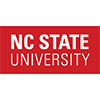 North Carolina State University (NCSU) features a hybrid Master of Arts in Teaching (MAT) that combines online and face-to-face learning and instruction for those who are seeking teacher certification. Certification tracks include elementary education and various content areas in middle and secondary education including English, math, science, and social studies. In addition to learning fundamental teaching skills, students are expected to engage in higher-level research in their content areas and learn how to use research-based methods in curriculum planning, instruction, and student assessment. Those seeking content-area endorsements must have at least 24 credit hours in the desired subject; content-area deficiencies may be remedied with specific coursework taken at NCSU, which may be in addition to the credit hours required to earn the MAT.
North Carolina State University (NCSU) features a hybrid Master of Arts in Teaching (MAT) that combines online and face-to-face learning and instruction for those who are seeking teacher certification. Certification tracks include elementary education and various content areas in middle and secondary education including English, math, science, and social studies. In addition to learning fundamental teaching skills, students are expected to engage in higher-level research in their content areas and learn how to use research-based methods in curriculum planning, instruction, and student assessment. Those seeking content-area endorsements must have at least 24 credit hours in the desired subject; content-area deficiencies may be remedied with specific coursework taken at NCSU, which may be in addition to the credit hours required to earn the MAT.
Admissions & Enrollment
Number of graduate students (campuswide): 10,4466
Acceptance rate (School of Education master’s): 31%3
Average GRE: 154 verbal; 150 quantitative; 4 analytical writing4
Tuition & Academics
In-state/out-of-state tuition per online credit hour: $526/$1,6358
In-state/out-of-state tuition per on-campus credit hour: $526/$1,6358
Online instructional faculty (School of Education): 62 full-time, 19 part-time4
Graduate Statistics
Average debt of 2022 graduates: $24,0425
Proportion of 2022 graduates with debt: 47%5
Kansas State University (#7)
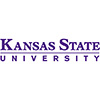 Through its Global Campus, Kansas State University (KSU) offers an online Master of Arts in Teaching (MAT) that can lead to teacher certification in the elementary grades (K to 6). The program is open to residents of Kansas and of other states and can be completed in 12 months. The curriculum is rigorous, and all courses must typically be followed in the school’s designated sequence. Courses are offered online except field experiences, which can be arranged in students’ local areas. Students can expect to complete 10 courses for a total of 31 credit hours in order to earn the MAT. A Transition to Teaching fellowship is available to qualified students who live within a 50-mile radius of Wichita, Topeka, or Kansas City. Students may also qualify for other financial aid programs, including the Public Service Loan Forgiveness Program or the Stafford Teacher Loan Forgiveness Program.
Through its Global Campus, Kansas State University (KSU) offers an online Master of Arts in Teaching (MAT) that can lead to teacher certification in the elementary grades (K to 6). The program is open to residents of Kansas and of other states and can be completed in 12 months. The curriculum is rigorous, and all courses must typically be followed in the school’s designated sequence. Courses are offered online except field experiences, which can be arranged in students’ local areas. Students can expect to complete 10 courses for a total of 31 credit hours in order to earn the MAT. A Transition to Teaching fellowship is available to qualified students who live within a 50-mile radius of Wichita, Topeka, or Kansas City. Students may also qualify for other financial aid programs, including the Public Service Loan Forgiveness Program or the Stafford Teacher Loan Forgiveness Program.
Admissions & Enrollment
Number of graduate students (campuswide): 4,6766
Acceptance rate (School of Education master’s): 96.5%3
Average GRE (School of Education master’s): 153 verbal; 154 quantitative; 4.2analytical writing3
Tuition & Academics
In-state/out-of-state tuition per online credit hour: $536/$5369
In-state/out-of-state tuition per on-campus credit hour: $450/$1,0079
Online instructional faculty (School of Education): 51 full-time, 18 part-time4
Graduate Statistics
Average debt of 2022 graduates: $25,5215
Proportion of 2022 graduates with debt: 50%5
Arizona State University (#8)
 Arizona State University (ASU) Online offers a Master of Education in Curriculum and Instruction-Early Childhood Education that is open to students with a bachelor’s degree in any field. The program prepares students to become certified teachers in grades K-3. All courses in the program are online, except for clinical experiences. The certification track requires 45 credit hours (five to six semesters) to complete. ASU also offers online master’s programs in English as a Second Language (ESL) and English to Speakers of Other Languages (TESOL) education. The school also offers on-campus master’s degrees in elementary, secondary, and special education as well as other content areas. Prospective students are encouraged to attend an online information session regarding the school’s programs to learn more prior to applying.
Arizona State University (ASU) Online offers a Master of Education in Curriculum and Instruction-Early Childhood Education that is open to students with a bachelor’s degree in any field. The program prepares students to become certified teachers in grades K-3. All courses in the program are online, except for clinical experiences. The certification track requires 45 credit hours (five to six semesters) to complete. ASU also offers online master’s programs in English as a Second Language (ESL) and English to Speakers of Other Languages (TESOL) education. The school also offers on-campus master’s degrees in elementary, secondary, and special education as well as other content areas. Prospective students are encouraged to attend an online information session regarding the school’s programs to learn more prior to applying.
Admissions & Enrollment
Number of graduate students (campuswide): 14,5736
Acceptance rate (School of Education master’s): 93.5%3
Average GRE: N.Av.4
Tuition & Academics
In-state/out-of-state tuition per online credit hour: $565/$69210
In-state/out-of-state tuition per on-campus credit hour: $687/$1,90510
Online instructional faculty (School of Education): 71 full-time, 26 part-time4
Graduate Statistics
Average debt of 2022 graduates: $17,8785
Proportion of 2022 graduates with debt: 40%5
University of Tennessee at Martin (#10)
 The University of Tennessee at Martin (UTM) offers a hybrid Master of Science in Education (MSEd) designed to lead to initial teacher licensure in Tennessee. Students may specialize in either elementary education (K-6), special education (K-8) or secondary education (7-12, with endorsements in various content areas available). The MSED requires 45 credit hours to complete and is based on courses in four areas: foundations, applications, the concentration area, and student teaching. As a transition to teaching program, students must have a teaching placement in order to qualify for full admission and to complete program requirements. Students typically coordinate with the department to arrange placements. UTM is also home to several on-campus master’s in education programs, with specialist tracks in agriculture education, English as a second language, gifted and talented education, and various other subjects.
The University of Tennessee at Martin (UTM) offers a hybrid Master of Science in Education (MSEd) designed to lead to initial teacher licensure in Tennessee. Students may specialize in either elementary education (K-6), special education (K-8) or secondary education (7-12, with endorsements in various content areas available). The MSED requires 45 credit hours to complete and is based on courses in four areas: foundations, applications, the concentration area, and student teaching. As a transition to teaching program, students must have a teaching placement in order to qualify for full admission and to complete program requirements. Students typically coordinate with the department to arrange placements. UTM is also home to several on-campus master’s in education programs, with specialist tracks in agriculture education, English as a second language, gifted and talented education, and various other subjects.
Admissions & Enrollment
Number of graduate students (campuswide): 7036
Acceptance rate (School of Education master’s): N.Av.3
Average GRE: N.Av.3
Tuition & Academics
In-state/out-of-state tuition per online credit hour: $378/$41611
In-state/out-of-state tuition per on-campus credit hour: $526/$86211
Online instructional faculty (School of Education): N.Av.4
Graduate Statistics
Average debt of 2022 graduates: N.Av.5
Proportion of 2022 graduates with debt: N.Av.5
Mayville State University (#11)
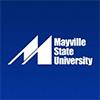 The Master of Arts in Teaching (MAT) program at Mayville State University (Mayville State) is designed to help students with non-teaching bachelor’s degrees become certified to teach at the secondary level. The MAT program is completely online except for the required Teaching Mentorship Clinical Experience (student teaching) and requires a total of 32 credit hours to complete. North Dakota residents who are currently teaching with a provisional license under Alternative Access may also be interested in this program. Though the online MAT is a relatively new teacher offering at Mayville State, the university has been focused on offering superior teacher education since 1889. The school also offers graduate-level continuing education for currently licensed teachers.
The Master of Arts in Teaching (MAT) program at Mayville State University (Mayville State) is designed to help students with non-teaching bachelor’s degrees become certified to teach at the secondary level. The MAT program is completely online except for the required Teaching Mentorship Clinical Experience (student teaching) and requires a total of 32 credit hours to complete. North Dakota residents who are currently teaching with a provisional license under Alternative Access may also be interested in this program. Though the online MAT is a relatively new teacher offering at Mayville State, the university has been focused on offering superior teacher education since 1889. The school also offers graduate-level continuing education for currently licensed teachers.
Admissions & Enrollment
Number of graduate students (campuswide): 466
Acceptance rate (School of Education master’s): N.Av.3
Average GRE: N.Av.3
Tuition & Academics
In-state/out-of-state tuition per online credit hour: $419/$41912
In-state/out-of-state tuition per on-campus credit hour: $331/$46612
Online instructional faculty (School of Education): N.Av.4
Graduate Statistics
Average debt of 2022 graduates: N.Av.5
Proportion of 2022 graduates with debt: N.Av.5
Old Dominion University (#13)
 Old Dominion University (ODU) maintains various online Master of Science in Education (MSEd) programs that can lead to initial teacher licensure in Virginia, including programs in elementary education (grades PreK to 6), secondary education (grades 6 to 12), and special education (mild disabilities K-12; early childhood; or adapted/severe disabilities grades K-12). Depending on the student’s concentration and certification track, the MSEd programs take between 34 and 45 credit hours to complete. Licensure track students will complete a practicum as well as a teacher candidate internship (student teaching). Those who do not have an undergraduate major in their subject(s) will need to take additional courses to meet content area requirements for licensure. The Darden College of Education at ODU also offers a Master of Science in Education (MSEd) military career transition program for military personnel and their spouses, as well as online professional development programs for certified teachers in STEM education and career and technical education and numerous on-campus certification programs.
Old Dominion University (ODU) maintains various online Master of Science in Education (MSEd) programs that can lead to initial teacher licensure in Virginia, including programs in elementary education (grades PreK to 6), secondary education (grades 6 to 12), and special education (mild disabilities K-12; early childhood; or adapted/severe disabilities grades K-12). Depending on the student’s concentration and certification track, the MSEd programs take between 34 and 45 credit hours to complete. Licensure track students will complete a practicum as well as a teacher candidate internship (student teaching). Those who do not have an undergraduate major in their subject(s) will need to take additional courses to meet content area requirements for licensure. The Darden College of Education at ODU also offers a Master of Science in Education (MSEd) military career transition program for military personnel and their spouses, as well as online professional development programs for certified teachers in STEM education and career and technical education and numerous on-campus certification programs.
Admissions & Enrollment
Number of graduate students (campuswide): 4,7326
Acceptance rate (School of Education master’s): 70.6%3
Average GRE (School of Education master’s): 149 verbal; 145 quantitative; 3.6 analytical writing4
Tuition & Academics
In-state/out-of-state tuition per online credit hour: $599/$62313
In-state/out-of-state tuition per on-campus credit hour: $599/$1,43913
Online instructional faculty (School of Education): 53 full-time, 60 part-time4
Graduate Statistics
Average debt of 2022 graduates: $31,2735
Proportion of 2022 graduates with debt: 71%5
Oregon State University (#18)
 The Oregon State University (OSU) Ecampus maintains a hybrid Master of Arts in Teaching (MAT) program that can lead to initial certification in elementary in Oregon. The degree requires 52 credit hours and two years to complete. Of the total required to earn the MAT, 16 credit hours are offered fully online, while 18 credit hours are offered in a hybrid format and 18 credit hours are completed in-person as practicum and internship experiences. Colloquially known as “Teach for Beaverton,” this program places graduate student teachers within the Beaverton School District, which is close to Portland. Students must commute to Beaverton two times per week during the first year of study and every weekday during the second year of study. Qualified students may be reimbursed for field experiences and student teaching with the program’s “earn while you learn” options.
The Oregon State University (OSU) Ecampus maintains a hybrid Master of Arts in Teaching (MAT) program that can lead to initial certification in elementary in Oregon. The degree requires 52 credit hours and two years to complete. Of the total required to earn the MAT, 16 credit hours are offered fully online, while 18 credit hours are offered in a hybrid format and 18 credit hours are completed in-person as practicum and internship experiences. Colloquially known as “Teach for Beaverton,” this program places graduate student teachers within the Beaverton School District, which is close to Portland. Students must commute to Beaverton two times per week during the first year of study and every weekday during the second year of study. Qualified students may be reimbursed for field experiences and student teaching with the program’s “earn while you learn” options.
Admissions & Enrollment
Number of graduate students (campuswide): 5,3876
Acceptance rate (School of Education master’s): 50.5%3
Average GRE: N.Av.3
Tuition & Academics
In-state/out-of-state tuition per online credit hour: $560/$56014
In-state/out-of-state tuition per on-campus credit hour: $464/$88014
Online instructional faculty (School of Education): 24 full-time, 46 part-time4
Graduate Statistics
Average debt of 2022 graduates: $26,0495
Proportion of 2022 graduates with debt: 50%5
University of Southern California (#20)
 The University of Southern California (USC) Rossier School of Education features an online Master of Arts in Teaching (MAT) that prepares graduates to become certified teachers. Courses in the program blend theory with hands-on learning and practice, with a particular emphasis on preparing future teachers to work in urban and high-needs schools. Students may enter the program, which requires 28 credit hours to complete, on a full-time or part-time track. Both elementary and secondary concentrations are offered. The school utilizes its partnerships with K-12 school districts across the US to help students find appropriate local placements. With additional coursework, students may also earn a special education credential or gifted education certificate. Graduates of the MAT program are prepared to seek a California Level 1 Preliminary teaching credential. USC Rossier also offers online master’s programs in Teaching English to Speakers of Other Languages (TESOL) and Learning Design and Technology.
The University of Southern California (USC) Rossier School of Education features an online Master of Arts in Teaching (MAT) that prepares graduates to become certified teachers. Courses in the program blend theory with hands-on learning and practice, with a particular emphasis on preparing future teachers to work in urban and high-needs schools. Students may enter the program, which requires 28 credit hours to complete, on a full-time or part-time track. Both elementary and secondary concentrations are offered. The school utilizes its partnerships with K-12 school districts across the US to help students find appropriate local placements. With additional coursework, students may also earn a special education credential or gifted education certificate. Graduates of the MAT program are prepared to seek a California Level 1 Preliminary teaching credential. USC Rossier also offers online master’s programs in Teaching English to Speakers of Other Languages (TESOL) and Learning Design and Technology.
Admissions & Enrollment
Number of graduate students (campuswide): 28,2466
Acceptance rate (School of Education master’s): N.Av.3
Average GRE: N.Av.3
Tuition & Academics
In-state/out-of-state tuition per online credit hour: $2,244/$2,24415
In-state/out-of-state tuition per on-campus credit hour: $2,244/$2,24415
Online instructional faculty (School of Education): N.Av.4
Graduate Statistics
Average debt of 2022 graduates: $17,9165
Proportion of 2022 graduates with debt: 31%5
Northwestern State University of Louisiana (#23)
 Northwestern State University of Louisiana (NSULA) is home to various Master of Arts in Teaching (MAT) programs developed as alternate routes to certification in various grade levels and subjects, from early childhood education to secondary education. All courses in the MAT are offered online, except for the required field and practicum experiences. The degree typically requires 33 to 39 credits to complete, depending on the student’s focus area. All students complete a one-year (two-semester) student teaching internship as part of the program. Graduates are eligible to apply for initial teacher licensing in Louisiana. NSULA also offers various professional development master’s programs for currently certified teachers, including the only Master of Education in Early Childhood Education in Louisiana.
Northwestern State University of Louisiana (NSULA) is home to various Master of Arts in Teaching (MAT) programs developed as alternate routes to certification in various grade levels and subjects, from early childhood education to secondary education. All courses in the MAT are offered online, except for the required field and practicum experiences. The degree typically requires 33 to 39 credits to complete, depending on the student’s focus area. All students complete a one-year (two-semester) student teaching internship as part of the program. Graduates are eligible to apply for initial teacher licensing in Louisiana. NSULA also offers various professional development master’s programs for currently certified teachers, including the only Master of Education in Early Childhood Education in Louisiana.
Admissions & Enrollment
Number of graduate students (campuswide): 9846
Acceptance rate (School of Education master’s): 89%4
Average GRE (School of Education master’s): 145 verbal; 141 quantitative; 3 analytical writing4
Tuition & Academics
In-state/out-of-state tuition per online credit hour: $718/$71816
In-state/out-of-state tuition per on-campus credit hour: $718/$1,16816
Online instructional faculty (School of Education): 23 full-time, 27 part-time4
Graduate Statistics
Average debt of 2022 graduates: N.Av.5
Proportion of 2022 graduates with debt: N.Av.5
University of Arkansas at Monticello (#33)
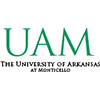 The University of Arkansas at Monticello (UAMONT) is home to an online Master of Arts in Teaching (MAT) with a choice of certification tracks in the elementary, middle, or secondary grades. Each MAT track requires 30 credit hours to complete. Once admitted, students typically take two to three courses per semester, including two consecutive semester-long student teaching internships during the final year. Students are assisted by the graduate coordinator’s office in securing a student teaching placement prior to beginning the student teaching practicum. As this placement and the associated provisional license is a condition of continuing admission, students must post acceptable scores on both the Praxis Core Academic Skills for Educators and the Praxis Subject Assessment for their desired content area. UAMONT also offers online master’s programs in physical education, educational leadership, teacher leadership, and special education.
The University of Arkansas at Monticello (UAMONT) is home to an online Master of Arts in Teaching (MAT) with a choice of certification tracks in the elementary, middle, or secondary grades. Each MAT track requires 30 credit hours to complete. Once admitted, students typically take two to three courses per semester, including two consecutive semester-long student teaching internships during the final year. Students are assisted by the graduate coordinator’s office in securing a student teaching placement prior to beginning the student teaching practicum. As this placement and the associated provisional license is a condition of continuing admission, students must post acceptable scores on both the Praxis Core Academic Skills for Educators and the Praxis Subject Assessment for their desired content area. UAMONT also offers online master’s programs in physical education, educational leadership, teacher leadership, and special education.
Admissions & Enrollment
Number of graduate students (campuswide): 4496
Acceptance rate (School of Education master’s): N.Av.3
Average GRE: N.Av.3
Tuition & Academics
In-state/out-of-state tuition per online credit hour: $440/$68517
In-state/out-of-state tuition per on-campus credit hour: $440/$68517
Online instructional faculty (School of Education): N.Av.4
Graduate Statistics
Average debt of 2022 graduates: N.Av.5
Proportion of 2022 graduates with debt: N.Av.5
University of Saint Francis (#28)
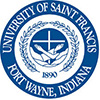 The University of Saint Francis in Indiana offers an online Master of Arts in Teaching (MAT) designed to lead to initial certification in grades five to 12 as well as an online certification-track Master of Education (M.Ed.) in Special Education. The special education M.Ed. can qualify graduates to work in mild or intense intervention with children with disabilities. Prospective students should note that the M.Ed carries more competitive admissions requirements than the MAT. All students must maintain a GPA of 3.0 for continuous enrollment in the school’s graduate programs. The University of Saint Francis also offers a Transition to Teaching alternative route with online courses that can later be transferred towards the MAT.
The University of Saint Francis in Indiana offers an online Master of Arts in Teaching (MAT) designed to lead to initial certification in grades five to 12 as well as an online certification-track Master of Education (M.Ed.) in Special Education. The special education M.Ed. can qualify graduates to work in mild or intense intervention with children with disabilities. Prospective students should note that the M.Ed carries more competitive admissions requirements than the MAT. All students must maintain a GPA of 3.0 for continuous enrollment in the school’s graduate programs. The University of Saint Francis also offers a Transition to Teaching alternative route with online courses that can later be transferred towards the MAT.
Admissions & Enrollment
Number of graduate students (campuswide): 3271
Acceptance rate (School of Education): N.Av.3
Average GMAT/GRE: N.Av.
Tuition & Academics
In-state/out-of-state tuition per online credit hour: $535/$53518
In-state/out-of-state tuition per on-campus credit hour: N/A18
Full-time online instructional faculty (School of Education): N.Av.3
Graduate Statistics
Average debt of 2022 graduates: N.Av.5
Proportion of 2022 graduates with debt: N.Av.5
University of the Cumberlands (#34)
 The University of the Cumberlands offers an online Master of Arts in Teaching (MAT) that can lead to certification in elementary, middle, or secondary education, as well as select content areas across kindergarten to grade 12. The online curriculum blends theory with on-the-ground practice, which is emphasized through in-person field experiences that may be completed in students’ local areas. The majority of courses are offered in eight-week terms, and students may take up to two courses per term. Past cohorts have completed the MAT program in an average of 18 months. The program is designed to lead to teacher certification in Kentucky; out-of-state candidates should review their state’s requirements for certification by reciprocity. The school also offers an online Master of Arts in Education (MAEd) for currently certified teachers as well as programs that lead to higher-level teaching certificates under Kentucky’s credential rank system.
The University of the Cumberlands offers an online Master of Arts in Teaching (MAT) that can lead to certification in elementary, middle, or secondary education, as well as select content areas across kindergarten to grade 12. The online curriculum blends theory with on-the-ground practice, which is emphasized through in-person field experiences that may be completed in students’ local areas. The majority of courses are offered in eight-week terms, and students may take up to two courses per term. Past cohorts have completed the MAT program in an average of 18 months. The program is designed to lead to teacher certification in Kentucky; out-of-state candidates should review their state’s requirements for certification by reciprocity. The school also offers an online Master of Arts in Education (MAEd) for currently certified teachers as well as programs that lead to higher-level teaching certificates under Kentucky’s credential rank system.
Admissions & Enrollment
Number of graduate students (campuswide): 12,8796
Acceptance rate (School of Education master’s): 95.8%3
Average GRE: N.Av.3
Tuition & Academics
In-state/out-of-state tuition per online credit hour: $315/$31519
In-state/out-of-state tuition per on-campus credit hour: N/A19
Online instructional faculty (School of Education): 24 full-time, 171 part-time4
Graduate Statistics
Average debt of 2022 graduates: N.Av.5
Proportion of 2022 graduates with debt: N.Av.5
Frequently Asked Questions
Question: Can an online master’s in education really help me become licensed as a teacher?
Answer: Distance learning options for earning a master’s in education online are a flexible way to meet certification requirements and become a classroom teacher if your bachelor’s degree was not in education. Many such programs also offer accelerated completion options, allowing you to begin a new career in teaching in less time.
Question: If my bachelor’s degree was in a subject like psychology or communications, can I still become a teacher with a master’s degree?
Answer: While coursework requirements vary by state, you typically must have a major or its equivalent in order to teach a given subject at the high school level. You will need to meet state subject matter requirements in all core content areas in order to qualify to teach elementary grades. However, master’s degree coursework can sometimes count towards these requirements. We suggest checking with your state board of education for current subject hour requirements by grade level and content area in order to determine the best pathway for you.
Question: What is the difference between a master’s in education, a master’s in teaching, and related degree names?
Answer: The different names for master’s degrees in education are often used interchangeably, and sometimes may be interpreted differently from region to region. However, it is common for master’s in education programs to be focused on professional development, while master’s in teaching programs are more focused on classroom skills. For more information on the differences between master’s in education, master’s in teaching, and other graduate programs in the education field, see our guide to traditional master’s degrees in teaching and education.
References:
1. Council for the Accreditation of Educator Preparation: http://caepnet.org/provider-search
2. College Factual: https://www.collegefactual.com/colleges/
3. US News & World Report Best Graduate Education Schools 2023-24: https://www.usnews.com/best-graduate-schools/top-education-schools/edu-rankings?int=a3a109
4. US News & World Report Best Online Graduate Education Programs: https://www.usnews.com/education/online-education/education/rankings
5. US News & World Report National University Rankings: https://www.usnews.com/best-colleges/rankings/national-universities
6. National Center for Education Statistics College Navigator: https://nces.ed.gov/collegenavigator/
7. University of Virginia: https://www.virginia.edu/
8. North Carolina State University: https://www.ncsu.edu/
9. Kansas State University: https://www.k-state.edu/
10. Arizona State University: https://www.asu.edu/
11. University of Tennessee at Martin: https://www.utm.edu/
12. Mayville State University: https://www.mayvillestate.edu/
13. Old Dominion University: https://odu.edu/
14. Oregon State University: https://oregonstate.edu/
15. University of Southern California: https://www.usc.edu/
16. Northwestern State University of Louisiana: https://www.nsula.edu/
17. University of Arkansas at Monticello: https://www.uamont.edu/index.html/
18. Saint Francis University: https://www.sf.edu/
19. University of the Cumberlands: https://www.ucumberlands.edu/
